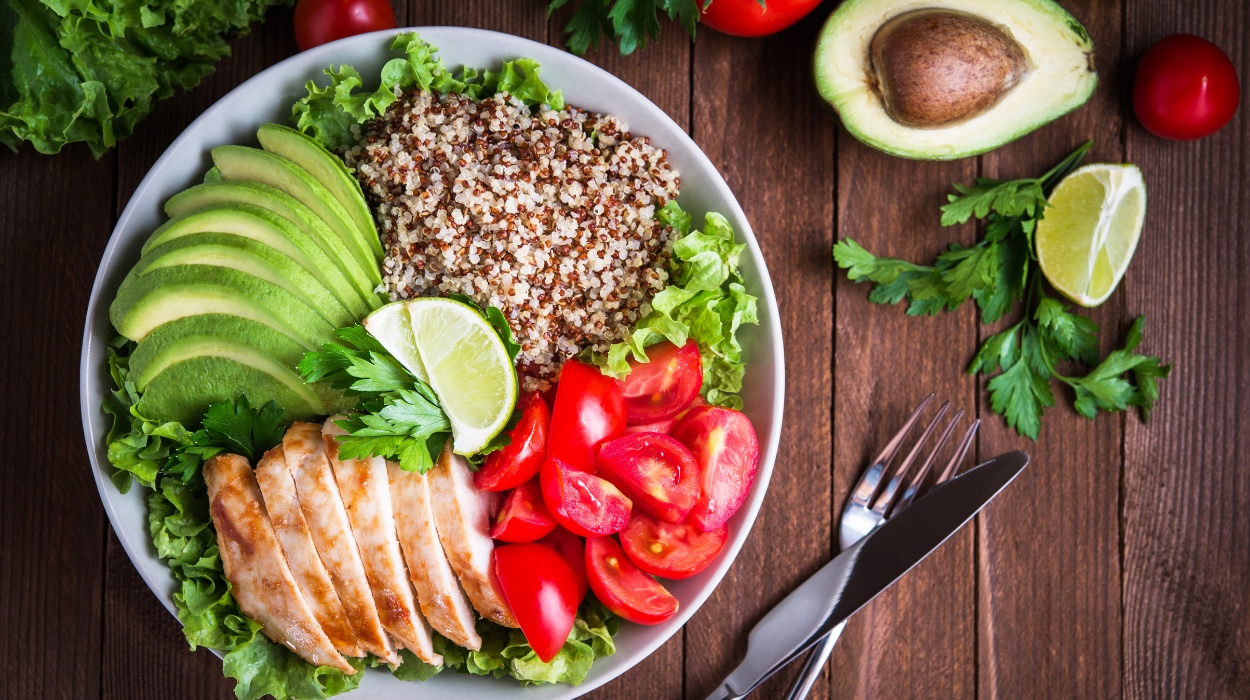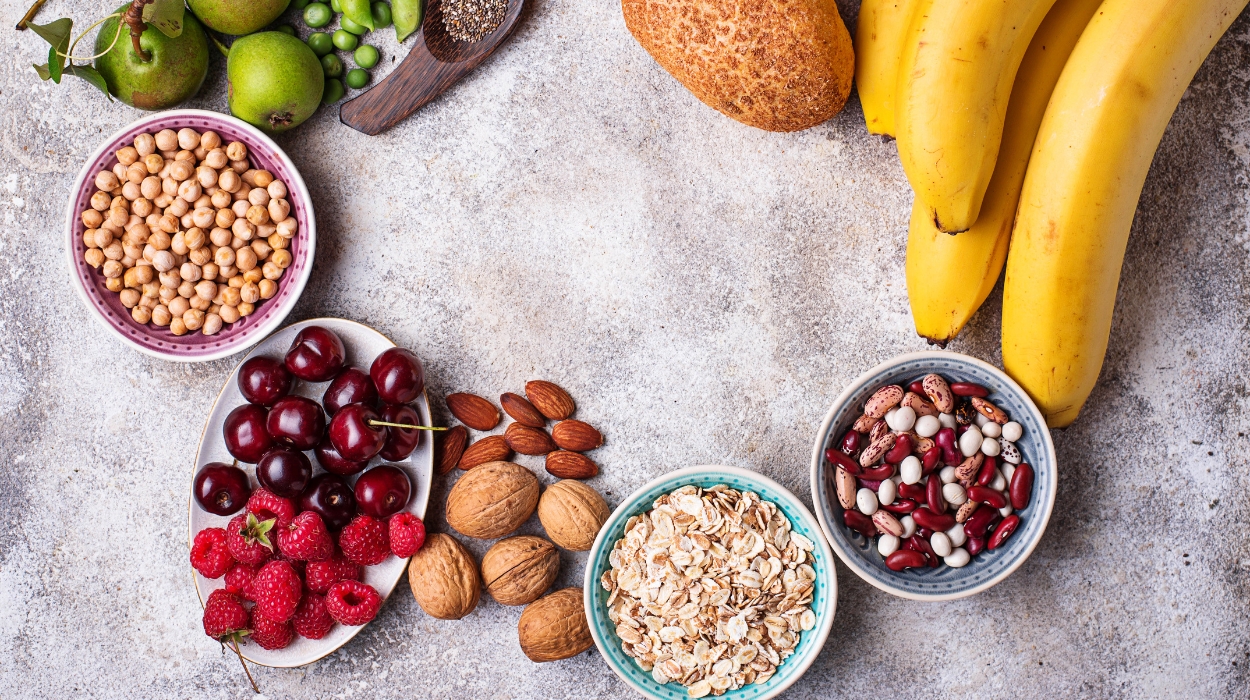One of the main causes of irritable bowel syndrome[1] or IBS is poor diet. IBS is a gut-brain interaction disorder. With this disorder, the gastrointestinal tract looks healthy but does not function as it should. Possible causes of IBS include abnormal muscle contractions, hypersensitive nerves, gut bacteria changes, and stress.
The digestive system is the body’s nutrition bank. Whatever you consume nourishes all body systems, including the natural detoxification organs, the liver and kidneys. In return, the body efficiently eliminates most toxins and pathogens.
If you often wonder how you can detox your body, diet is a crucial method.
IBS may cause bloating, gas, abdominal pain, diarrhea, or constipation after consuming a trigger food. So, to help you avoid any IBS flare-ups, in this article, we highlight the best irritable bowel syndrome diet.
Irritable Bowel Syndrome Diet
An irritable bowel syndrome diet includes:
- Low-FODMAP diets.
- Gluten-free diets.
- Low-histamine diets.
- Balanced diets.
Irritable Bowel Syndrome Diet

To choose the best IBS diet, you must first understand how IBS presents to different people. Common symptoms include abdominal pain and irregular bowel movements, but some people have diarrhea or constipation-dominant IBS.
Therefore, identifying and avoiding possible triggers is crucial to easing IBS symptoms. The list of diets below should be considered when searching for the best irritable bowel syndrome diets.
Low FODMAP Diets
A low FODMAP diet contains few fermentable oligosaccharides, disaccharides, monosaccharides, and polyols. FODMAP foods are a group of carbohydrates that resist digestion in the small intestines. As digestion continues, these undigested FODMAPs get to the large intestine. The bacteria there ferments the foods and produces gas, which may be why an IBS patient feels gassy.
A Low FODMAP diet is a great way to treat IBS.[2] We highlight some examples in the following section.
Gluten-Free Diets
Gluten is the leading trigger food for people with celiac disease. However, eating gluten may also aggravate IBS symptoms.[3] Gluten is a protein found in rye, barley, and wheat. Consuming gluten may inflame the gut lining[4] or alter the gut microbiome,[5] further aggravating IBS symptoms.
A gluten-free diet will relieve an IBS patient’s woes. Eliminating gluten-containing foods can reduce discomfort and gas, thus improving digestive health.
Low Histamine Diet
Certain foods may produce histamine, and histamine intolerance[6] can mimic IBS symptoms. Histamine is a chemical that aids many bodily functions, including inflammation. However, too much histamine can cause various symptoms,[7] including abdominal pain, bloating, diarrhea, itching, and headaches.
A low-histamine irritable bowel syndrome IBS diet involves avoiding high-histamine foods such as fermented, processed foods and specific proteins. Examples of high-histamine foods that you should avoid eating are:
- Aged cheeses.
- Fermented foods, such as sauerkraut, kimchi, and kombucha.
- Cured meats, such as bacon, sausage, and pepperoni.
- Fish and shellfish.
- Smoked meats and fish.
- Chocolate.
On the flip side, here is a list of low-histamine foods that can help reduce your IBS symptoms and therefore should be incorporated more in your IBS diet:
- Fruit: Apples, apricots, bananas, blueberries, cranberries, grapes, honeydew melon, kiwi, lemons, limes, mangoes, oranges, peaches, pears, plums, raspberries, strawberries, and watermelon.
- Vegetables: Asparagus, carrots, cauliflower, celery, cucumber, eggplant, ginger, lettuce, mushrooms, onions, peas, potatoes, spinach, and sweet potatoes.
- Grains: Brown rice, oats, and quinoa
- Protein: Chicken, eggs, fish, lamb, pork, and turkey.
- Dairy: Hard cheeses, such as cheddar and Parmesan, lactose-free milk and yogurt.
- Other foods: Olive oil, herbs and spices, nuts and seeds in moderation, and vegetable oils.
Balanced Diet
If you have IBS, any trigger to the GI tract causes pain and discomfort. Therefore, maintaining a balanced diet is essential. However, restrictive diets may lead to nutritional deficiencies. It’s crucial to manage IBS while ensuring adequate nutrient intake. Also, consider consulting a dietitian if you find planning meals around your IBS challenging.
Foods For Irritable Bowel Syndrome

Dietary fiber can be beneficial to the colon in Irritable bowel syndrome. First, it bulks stool by increasing water retention, facilitating regular healthy bowel movements,[8] and avoiding constipation. Second, IBS patients can use these foods to help with bowel movements. Fiber may also nourish the gut microbiome.[9] foods to help with bowel movements
All the advantages of a high-fiber diet significantly alleviate the symptoms in the colon in irritable bowel syndrome.
In your diet, include mainly soluble and limit insoluble fibers. The soluble fibers can help with low gas production.[10] Insoluble fiber bulks stool, but the issue with insoluble fibers is that they also ferment in the large intestines, producing gas.[11] This can aggravate IBS symptoms rather than aid them.
Here is a list of soluble fibers to prioritize:
- Fruits and veggies.
- Whole grains.
- Beans and lentils.
- Nuts and seeds.
- Psyllium and oat bran.
Please note that when it comes to fiber, some IBS sufferers may be sensitive to certain high-fiber foods. Foods like bran or cruciferous vegetables can trigger uncomfortable symptoms. Therefore, finding the right balance and gradually introducing one fiber-rich food at a time is essential.
Gut-Friendly Probiotic Foods
Probiotics are a class of good bacteria that nourish our digestive tract’s[12] natural gut flora. This leads to less inflammation[13] and improved stool consistency.[14] For these reasons, IBS patients would possibly experience fewer IBS flare-ups.
Some probiotics to add to your diet are:
- Yogurt.
- Kefir.
- Lactose-free yogurt.
- Sauerkraut.
- Kimchi.
It is important to note that not all strains of probiotics work for everyone. Thus, you should experiment with them to find the right probiotic-rich foods that suit you. You could try Bacillus coagulans strain LBSC (DSM17654), which alleviates IBS symptoms[15] like abdominal pain, vomiting, diarrhea, and constipation.
Low FODMAP Foods
As discussed above, Low FODMAP foods benefit many IBS patients.
Examples of low FODMAP foods are:
- Fruit: Bananas, blueberries, cantaloupe, grapefruit, honeydew, kiwi, lemon, lime, oranges, and strawberries.
- Vegetables: Asparagus, bamboo shoots, bean sprouts, bok choy, carrots, chives, cucumbers, eggplant, ginger, lettuce, olives, parsnips, potatoes, spring onions, and turnips.
- Grains: Oats, quinoa, and brown rice.
- Protein: Beef, chicken, fish, eggs, pork, and tofu.
- Dairy: Lactose-free milk, yogurt, and hard cheeses.
- Other foods: Almond milk, coconut milk, rice milk, and soy milk.
Omega-3 Rich Foods
Omega-3 fatty acids are abundant in fatty fish and possess anti-inflammatory properties. These offer some gut inflammation relief[16] associated with IBS.
Examples of omega-3-rich foods are:
- Fish and seafood: Include fatty fish such as salmon, mackerel, tuna, herring, sardines, and anchovies.
- Nuts and seeds: Flaxseeds, chia seeds, and walnuts are all good sources of omega-3 fatty acids.
- Plant oils: Flaxseed, soybean, and canola oil are rich in omega-3 fatty acids.
- Fortified foods: Some foods, such as eggs, yogurt, juices, milk, soy beverages, and infant formulas, come fortified with omega-3 fatty acids.
Additional Food Groups
Despite the above four food groups offering all the needed IBS symptom relief, you also need to include the following:
- Lean proteins like chicken and beans.
- Healthy fats like avocados, nuts, and seeds.
- Fluids.
Irritable Bowel Syndrome Foods To Avoid
We’ve discussed the irritable bowel syndrome diets and foods to include; here are the ones to avoid that trigger IBS symptoms.
Gas-Producing Foods
Foods that produce gas can worsen symptoms of IBS.
Common culprits include kidney beans, lentils, carbonated drinks, and vegetables like broccoli and cabbage. Avoiding or minimizing these foods can help reduce abdominal bloating and flatulence, relieving IBS patients.
Diarrhea-Causing Foods
If you suffer from IBS-D, a diarrhea-dormant IBS, these are the foods you should avoid.
Limit:
- High-fat foods.
- Fried foods.
- Spicy foods.
- Processed foods.
- Artificial sweeteners.
These foods can trigger and exacerbate diarrhea episodes and can cause gas, back pain,[17] and discomfort associated with IBS-D. Opting for lower-fat cooking ways and choosing leaner food options can help reduce the risk of symptom flare-ups.
High-FODMAP Foods
High FODMAP foods aggravate IBS by worsening flatulence, gas, bloating, and abdominal pain. So, for a healthier IBS diet, eliminate foods rich in FODMAPs like
- Wheat products.
- Apples and pears.
- Dairy products.
- Some sweeteners.
Other Tips
In addition to including and excluding specific foods, several other strategies can enhance your irritable bowel syndrome diet plan. Here are a few tips:
- Eating smaller, more frequent meals can help prevent overloading the digestive system.
- Take your time to chew food slowly and thoroughly. This can aid in better digestion and reduce the likelihood of swallowing excess air, which can contribute to gas and bloating.
- Establish regular meal times to help regulate bowel movements and promote digestive regularity.
- Drinking water and avoiding carbonated beverages can aid digestion and reduce gas.
- Alcoholic beverages can irritate the digestive tract and exacerbate IBS symptoms. Moderation or avoidance may be necessary for some.
- Fiber and probiotic supplements may be a good consideration under the guidance of a healthcare provider.
- Keeping a food diary can help you identify food intolerances, triggers, and patterns, leading to more effective symptom management.
- Sorbitol and mannitol, common artificial sweeteners, can have a laxative effect[18] and worsen symptoms. Check labels for these ingredients in sugar-free products.
- Manage and reduce stress through relaxation techniques like yoga[19] and regular exercise. These can complement your dietary efforts and contribute to overall IBS symptom improvement.
- If lactose intolerance is a concern, experiment with lactose-free dairy products or dairy alternatives like almond, coconut, or lactose-free milk.
- For a personalized guide to avoiding foods that aggravate your irritable bowel syndrome, consult a registered dietitian specializing in IBS. They can help create a customized diet plan tailored to your specific needs and triggers and help you find ways to increase appetite while on such restrictive diets.
- If necessary, work with your healthcare provider to explore IBS medications that complement your dietary efforts to manage IBS symptoms.
Conclusion
Such chronic digestive disorders can wreak havoc simply because you eat the wrong foods. The solution: balanced, healthy, IBS diets!
Eat foods that are fiber-rich, low-FODMAP, gluten-free, low-histamine, probiotic-rich, and omega-3 abundant Incorporate these into a balanced diet. Limit high-FODMAP foods, gas-producing, and diarrhea-triggering foods like carbonated drinks and many processed foods. Above all, stay hydrated.
A professional healthcare provider can help you design a practical IBS-healing food timetable.
With the right food choices, you will no longer seek remedies for “Why am I so gassy?” because you now have the answers!
Frequently Asked Questions
The best diet for IBS varies but often includes a low FODMAP or gluten-free approach tailored to individual food triggers.
The main foods to avoid with IBS are high-FODMAP foods, gas-producing items, and those causing diarrhea, like fatty or fried foods.
Probiotics may help some IBS sufferers by promoting gut health, but their effectiveness varies from person to person.
Peanut butter can be problematic for some with IBS due to its high-fat content. It’s essential to monitor individual reactions.
 Evidence Based
Evidence Based
